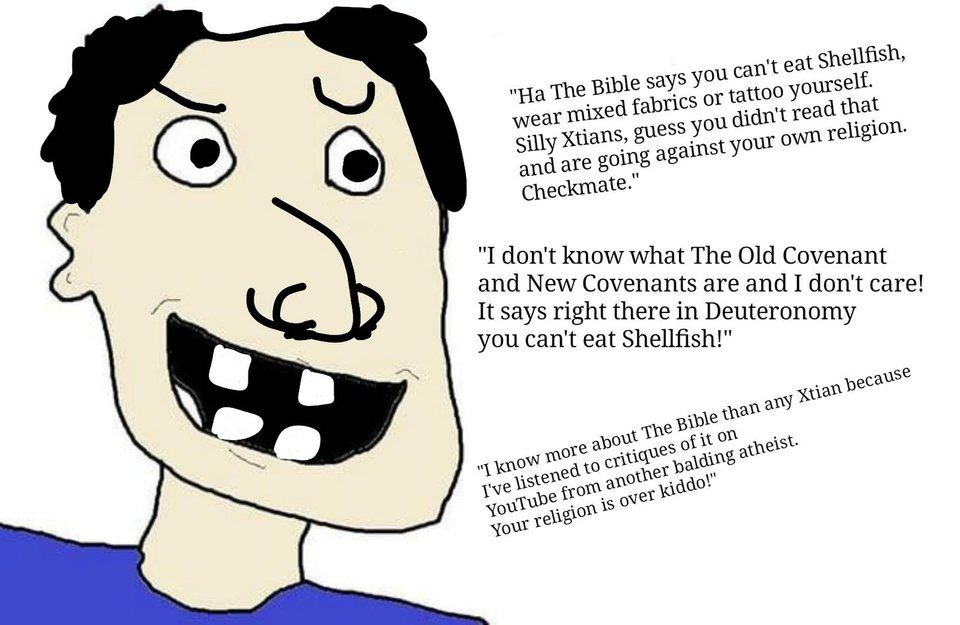You’ve heard the phrases “letter of the law” and “spirit of the law.” Well, when Paul talks about it, he means it literally, as in the Holy Spirit. Jesus, Paul, and most of the early church ran into Jewish officials who cared more about the letter of the law than the spirit, which is why they spent so much time insisting we need to do more than just follow the law.
However, we don’t follow every Mosaic law, because Jesus has fulfilled the law. Some moral precepts remain, but time and cultural-specific ones do not.
Today’s readings are basically a response to anyone who tries to bring up random Old Testament laws as an argument against Christianity—
Reading 1
2 Cor 3:4-11
Brothers and sisters: Such confidence we have through Christ toward God. Not that of ourselves we are qualified to take credit for anything as coming from us; rather, our qualification comes from God, who has indeed qualified us as ministers of a new covenant, not of letter but of spirit; for the letter brings death, but the Spirit gives life.
Now if the ministry of death, carved in letters on stone, was so glorious that the children of Israel could not look intently at the face of Moses because of its glory that was going to fade, how much more will the ministry of the Spirit be glorious? For if the ministry of condemnation was glorious, the ministry of righteousness will abound much more in glory. Indeed, what was endowed with glory has come to have no glory in this respect because of the glory that surpasses it. For if what was going to fade was glorious, how much more will what endures be glorious.
Paul doesn’t hate the old law; it’s very important to him. But he understands it’s limited, too. Everyone who followed the old law will die.
But Jesus’ words lead to eternal life. It’s no longer enough to follow the letter of the old law, but the Holy Spirit.
Responsorial Psalm
Ps 99:5, 6, 7, 8, 9
R. Holy is the Lord our God.
Extol the LORD, our God,
and worship at his footstool;
holy is he!
R. Holy is the Lord our God.
Moses and Aaron were among his priests,
and Samuel, among those who called upon his name;
they called upon the LORD, and he answered them.
R. Holy is the Lord our God.
From the pillar of cloud he spoke to them;
they heard his decrees and the law he gave them.
R. Holy is the Lord our God.
O LORD, our God, you answered them;
a forgiving God you were to them,
though requiting their misdeeds.
R. Holy is the Lord our God.
Extol the LORD, our God,
and worship at his holy mountain;
for holy is the LORD, our God.
R. Holy is the Lord our God.
God spoke to the Israelites through Moses, who gave them the law. He also spoke to them through the prophets.
But even with these indirect means, He responded to their prayers. He continues to, which is why Jesus, in the Gospel, tells us he’s not abolishing God’s law but fulfilling it. There’s more!
Alleluia
Ps 25:4b, 5a
R. Alleluia, alleluia.
Teach me your paths, my God,
and guide me in your truth.
R. Alleluia, alleluia.
It’s kind of obvious to say, but this is why all this stuff is written down. So we can learn.
Gospel
Mt 5:17-19
Jesus said to his disciples: "Do not think that I have come to abolish the law or the prophets. I have come not to abolish but to fulfill. Amen, I say to you, until heaven and earth pass away, not the smallest letter or the smallest part of a letter will pass from the law, until all things have taken place. Therefore, whoever breaks one of the least of these commandments and teaches others to do so will be called least in the Kingdom of heaven. But whoever obeys and teaches these commandments will be called greatest in the Kingdom of heaven."
“Until heaven and earth pass away” is a weird translation of the original text. It’s a little clearer in Luke’s version: “It is easier for heaven and earth to pass away than....”1 Jesus is saying that even if the world ends, the Israelites are obligated to follow the law, until all is fulfilled.
And that’s what Jesus is here to do—fulfill the prophets. He’s not going to erase the law, but actually expand on it.2 Because what’s important isn’t the letter oft he law, but the spirit. And the spirit is love.
We’ll find out exactly what this means starting tomorrow, but then our progress through Matthew will be interrupted by the solemnities of the Sacred Heart of Jesus and Immaculate Heart of Mary, and a regular Sunday. We pick it up again on Monday, though.




